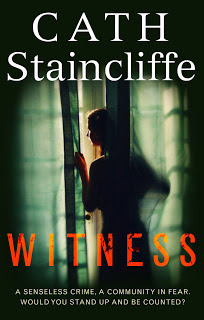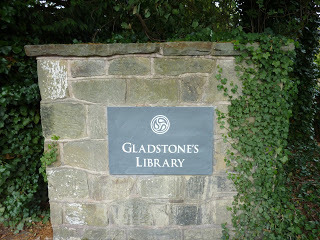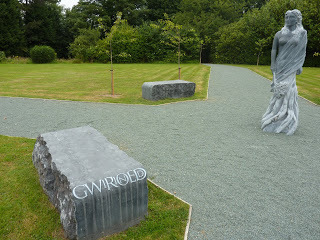Martin Edwards's Blog, page 261
August 9, 2011
The TV Book Club
One of the interesting features of having a blog about books is that sometimes there are unexpected benefits. For instance, you might be sent a book to review that is excellent but which you wouldn't otherwise have encountered. Sometimes, the approach relates to a book that has no appeal at all, of course, usually because the publicist in question hasn't done his or her homework and has simply sent out a scattergun email. But the pros far outweigh the cons.
From time to time I receive invitations to literary events in London which I can't attend because of my commitments back home. But out of the blue, I was invited to a TV recording recently, and by chance it coincided with my working in the capital. So I was able to squeeze it in. But I didn't really know what to expect.
The recording took place at Cactus TV studios in London, and featured two half-hour programmes of the TV Book Club, sponsored by Specsavers - a show which, I confess, I'd never encountered before. There wasn't a conventional studio audience, but the organisers had invited members of a reading group and also a small gang of bloggers. I was one, and I was glad to meet a number of fellow online scribes for the first time - very pleasant company they proved to be.
The show involves a book discussion between Jo Brand, Rory McGrath and assorted luminaries. These were the last two shows in a series of eight, covering eight books. The books discussed on the day were not crime fiction, and one, a misery memoir, sounded worthy but not really my cup of tea. But the other sounded very good, and I'll say more about it when I've finally read it - as the show encouraged me to do!
The show features a guest celebrity every week. On my visit, the celebs were Andrea Corr and Celia Imrie, two ladies of different generations but both glamorous and charismatic. I enjoyed this little jaunt a good deal, and it made me think quite hard not only about books but also about blogging and other forms of marketing.
August 7, 2011
Libel and fiction
When launching The Hanging Wood recently, I answered a few questions about the thorny topic of libel and fiction. Of course, given that (for instance) I have written a book featuring a library influenced by a real life model, it's something that occupies my thoughts. And even if I were not a lawyer, I think it's a very good idea not to be cavalier about the law of libel. Because one of its nasty features is that it is possible to libel someone unintentionally.
The risks are perhaps greater in crime fiction than in other types of book. After all, almost by definition, a crime novel will include a number of dodgy characters. Even the innocent among the suspects are likely to be flawed characters. Having said that, I do think that in practice, writers need to get things into perspective and not be too paranoiac. Taking sensible precautions by not using names or descriptions that you know to be mirrored in real life is advisable. But it's simply impossible to eliminate all potential resemblances and coincidences.
One tactic I use might seem contrary to the idea of precise research. You might call my method 'related research'. In The Hanging Wood, for instance, which features a caravan park, I talked to someone who owns such a park – but based in Wales, not the Lake District. And St Herbert's Library is also based on a Welsh, rather than Cumbrian model. There is plenty of action on a farm, but the farm I visited to research the book was in Lancashire, not Lakeland. I talked to a veteran police officer to get the police procedure (more or less!) right, but he's someone who works in Lincolnshire, not in the same area as Hannah Scarlett and her team. The historian who helps me is a retired Oxford don, not someone who has ever moved away to live the dream, as Daniel Kind did. The idea, in short, is to capture the elements that will create an impression of realism without turning the book into a pseudo-documentary.
I really would hate anyone to think that I'd depicted them, or their company, negatively in a novel. For me, fiction is in part about escaping from real life, not about using it to take pot shots at people (much though most of us writers may joke about so doing). I did take a very different approach with Dancing for the Hangman, which is the story of Dr Crippen's life. But not only is poor old Crippen long in his grave, so are all the other characters. Just as well, really.
August 4, 2011
Forgotten Book - I'll be Judge, I'll Be Jury
Continuing with my Milward Kennedy binge, I've chosen for today's Forgotten Book a novel from 1937, I'll Be Judge, I'll Be Jury. Despite the title, there is no real Lewis Carroll theme. But it's still an unusual piece of work.
The book's opening is daring for its date, with none of the sluggish build-up often found with Kennedy. Mary Dallas sneaks out from the hotel where she is staying with her husband very early one morning for a tryst in a beach hut. Under her short beach-coat, she is topless. But before encountering her lover, George Needham, she stumbles over the corpse of her guardian, while the murderer hides behind a curtain.
In a panic, Mary and George contrive to make the death look like an accident, and their hurried interference with the crime scene succeeds in confusing the police. All very foolish, and almost inevitably their behaviour leads inexorably to disaster.
An interesting feature of this book is that it references the classic Francis Iles novel, Before the Fact, and gives a fresh slant to the situation Iles devised. But whereas the Iles book was filmed by Hitchcock, Kennedy's really is well and truly forgotten. Undeservedly, I suggest.
Crimefest Memories
I'm very grateful to Roberta Rood for sending me a
Especially good to see that she's tracked down some of those elusive book covers. Thanks, Roberta!
I'm pleased to say that I've been asked by the organisers to moderate the same panel again next year - this will be the fourth year we've done it, and it's always highly enjoyable for me as well, I hope, as for the audience.
August 2, 2011
Cath Stainclife - Guest Blog

My Murder Squad mate Cath Staincliffe is the hugely successful creator of the TV series 'Blue Murder', as well as a varied and accomplished novelist. I'm delighted she has found time to contribute a guest post about her latest book.
'Back when I first started writing novels I only had a few hours a week to write and that became sacrosanct – I ignored anything else clamouring for attention (chores, I mean – the kids were safely off at playgroup and school) and knuckled down. I knew it was the only way I'd get anything finished. The limit on time meant it took me something like eighteen months to write a book and that novel was the sole focus of my writing time.
Years on and now working full-time writing television scripts and radio drama as well as novels and short stories, I find myself jumping between projects like a grasshopper. I still get things finished but I've had to develop the ability to switch from one story, one set of characters, one form to another, on a regular basis. Though I only ever have one novel on the go; I don't think I'd be able to do that hopping about between books but it's easier moving from a book to a radio play or a television treatment and back. Writing two novels at the same time would cause my brain to melt, I think – like reading two books at once, something I can't countenance.
At present I'm delivering a novel each year and that leads to some overlap of tasks: so for example I'm now busy promoting my latest publication WITNESS while I'm simultaneously re-reading and copy-editing SPLIT SECOND which will come out next year and also discussing new ideas for the book for 2013 with my agent and publisher.
Alongside that I've been proof-reading my contributions to BEST EATEN COLD (ed. Martin Edwards) a Murder Squad anthology, developing and pitching new television drama ideas, writing the script for a radio play in Danny Brocklehurst's STONE series, drawing up an entry for a scriptwriting competition and researching ideas for LEGACY, my own radio drama series. I like the variety. But it's interesting talking to other writers who much prefer to concentrate on one medium and would hate the mix I have. Novelists who say they couldn't cope with the collaborative nature of working in television or radio, with everybody chipping in and shaping the script and changing it beyond all recognition or scriptwriters who imagine the life of a novelist to be unremitting loneliness and isolation, with no-one to bounce ideas off and the tedium of working on one book for years on end. I think I'm lucky to have the best of both worlds. Though now and again there will be a lull after deadlines have been met when I have a few weeks to concentrate solely on one piece of work – and that does feel like a luxury. So maybe a bit of me hankers after the old days when it was one thing at a time – but it's just a bit. Honest.'
July 31, 2011
Launching The Hanging Wood



I enjoyed enormously the launch of The Hanging Wood last Thursday evening. The setting was both delightful and appropriate – the historic, atmospheric and tranquil Gladstone's Library, which gave me the idea for St Herbert's Residential Library, which plays a central part in the novel.
I gave a talk on the writing of a crime series, focusing not only on how I came to write the novel, but also the pros and cons of writing a series. I wanted to develop a theme I'd touched on in my panel at Harrogate the previous week-end. It is this: how do you write a book in the middle of a series that appeals to someone who hasn't read you before, without repeating information that will irritate your loyal and regular following? It's a topic to which I give a good deal of thought each time I write a series novel, yet I've never seen much discussion about it.
There was an excellent crowd, and I signed lots of books. Among many pleasant conversations, I was delighted to chat to the former Dean of Liverpool Cathedral, who helped me with some aspects of my last Harry Devlin book, Waterloo Sunset.
The staff of the Library were marvellous, as always. I had a pleasant dinner in the 'Food for Thought' restaurant before the launch – a place I strongly recommend for good meals. And then after a relaxing end to the day, reading an old Margery Allingham in my very well-appointed room, I enjoyed breakfast with some of the other residents the next morning. If you are ever in the North West, and looking for somewhere to stay, I'm sure that Gladstone's Library will fit the bill. It's quite unique.
July 28, 2011
Forgotten Book - Panic Party
My choice for today's Forgotten Book is a 1934 title from the pen of Anthony Berkeley. Panic Party, aka Mr Pidgeon's Island, was the last novel to feature Roger Sheringham - one of the great Golden Age amateur sleuths, even though his career lasted less than ten years.
The book begins with Berkeley's riposte to the challenge Milward Kennedy set him in Death to the Rescuea and which I mentioned last week:
"You once challenged me, in public print, to write a book in which the only interest should be the detection. I have no hesitation in refusing to do anything so tedious, and instead take the greatest pleasure in dedicating to you a book which is precisely the opposite, which breaks every rule of the austere Club to which we both belong, and which will probably earn my expulsion from its membership."
In fact, the novel does not break all the Club's rules by a long stretch. Sheringham joins a yachting party organised by Guy Pidgeon, an Oxford don who has come into the money. The group finds itself marooned on a desert island, and Pidgeon announces that their party includes a murderer. His 'murder game' has a predictable outcome – soon he is found dead.
When I first read this book years ago, I felt rather dissatisfied with it. On a second reading, I was more sympathetic. It's an interesting experiment. almost a forerunner of Lord of the Flies. And, as usual with this author, there are some witty passages as well as several darker ones.
Agatha Christie's True Crime Inspirations
I'm interested in the ways in which crime novelists are influenced in their work by real-life cases. Examples of those influences go back to the days of Edgar Allan Poe and Wilkie Collins, and a number of writers of the modern generation draw on actual crimes, as did a host of detective novelists in the Golden Age.
Agatha Christie, however, is generally not thought of as a novelist who was greatly influenced by true crime. However, a book published last year by the History Press, and written by Mike Holgate, seeks to prove otherwise. Agatha Christie's True Crime Inspirations is relatively short but lively book which ranges widely, sometimes more widely than the title would suggest.
The classic example of a novel where Christie did draw on a real-life crime is Murder on the Orient Express, which was plainly inspired by the kidnapping of the baby of the American aviator Charles Lindbergh – although, of course, Christie used a great deal of imagination to embellish the basic material and produce one of the most famous whodunnits of all time.
Christie was certainly interested in true crime, making references to the Dr Crippen and Constance Kent cases, amongst others, in her novels. But there are not many books which draw heavily upon her interpretation of real-life cases – for instance, I think it is a bit of a stretch to suggest that exploits of Jack the Ripper was an inspiration for The ABC Murders. So Mike Holgate compensates by including various accounts of crimes, scandals and tragedies which affected the lives of some of the famous personalities involved in Christie's long career. As a result, the book is not quite what I expected – but I found it an entertaining read.
July 27, 2011
The Woman in Question
The Woman in Question is a relatively unsung film, made in 1950 by Anthony Asquith, the son of a former Prime Minister. I found a DVD version in my quest for whodunit movies – as I've mentioned before in this blog, they are much scarcer than thrillers. And I certainly wasn't disappointed with this one.
A woman (played by Jean Kent) who scrapes a living as a fortune teller in a small seaside town is found strangled in her home. A police team headed by Duncan MacRae investigates and interviews a series of witnesses and potential suspects. The unusual and clever feature of the film is that each witness portrays the victim in a different light, so that understanding her character from the contrasting accounts becomes key to solving the crime. What other books and films have done this so explicitly? A few, but not a large number, I think.
Among the witnesses is a young stage performer played by Dirk Bogarde, whose American accent is so ropey that it comes as a great relief when he admits to his girlfriend that he was actually born in Liverpool – not that there is any trace of a Scouse accent, either. But overall he and the rest of the cast do a good job.
When it emerged that the dead woman had a pet parrot, I anticipated that the bird would provide the detectives with a vital clue, and so it proved. I managed to figure out the identity of the murderer, but this did not in any way spoil my enjoyment of a short, snappy and entertaining mystery movie. It is almost a British film noir, and I can definitely recommend it.
July 25, 2011
The Stepfather
I haven't seen the 1987 original of which the 2009 film The Stepfather is a re-make, but the new version offers both the positive and negative aspects of psychological thrillers and it's as interesting to discuss those issues as to talk about the film itself.
But as to the film, Dylan Walsh plays Grady Edwards, who as the opening credits roll calmly disguises himself as he walks away from a home which has became a crime scene – he has murdered his family. A weakness of the film is that we never know why. The man is deliberately elusive, but the script should (in my opinion) have offered more insight into his make-up.
Calling himself David Harris, he quickly befriends an attractive divorced woman who decides he is perfect and invites him into her life and her family. Only her older son has suspicions – on which the son's girlfriend, played by the frequently bikini-clad Amber Heard, unwisely pours scorn. The stepfather takes great pains to hide his identity and not be photographed, yet stupidly gives himself away by forgetting his story about his false past.
In essence, this is a formulaic movie, but quite well done. Was it a mistake to make it clear from the outset that Harris is a baddie? I think so. Was it unwise not to portray the characters in more depth? Undoubtedly. Yet I kept watching – the action is well-paced and not unduly prolonged. The final scene suggests a sequel is in the offing. Will I watch it? Perhaps.



